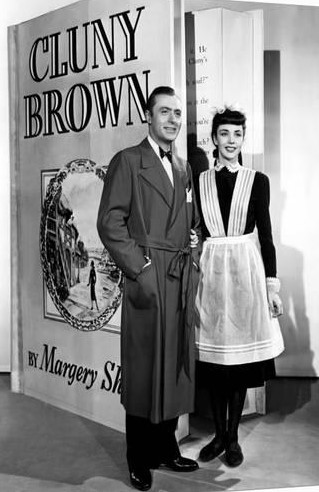Cluny Brown (1946) is a romantic comedy produced and directed by Ernst Lubitsch and starring Charles Boyer and Jennifer Jones. The film is based on the novel of the same name by Margery Sharp. The cinematography was by Joseph LaShalle (Laura 1944). The supporting cast includes Peter Lawford, Helen Walker, Reginald Owen, Reginald Gardiner, Richard Haydn, C. Aubrey Smith, Sara Allgood, Florence Bates, Margaret Bannerman, and Una O'Connor.
Cluny Brown (Jones) is an orphan who lives with her uncle (Billy Bevan), a plumber. Cluny has learned all about plumbing from her uncle, but her uncle doesn't think being a plumber is good for a young woman. By coincidence, Cluny meets Adam Belinski at the London home of Mr. Ames (Gardiner). Mr. Ames is having plumbing issues and Cluny manages to fix the issue, much to the surprise of both Belinski and Ames. Cluny and Belinski hit it off and seem to make a special connection.
Unfortunately, Cluny's uncle procures a job for Cluny as a parlor maid at the country estate of Sir Henry Carmel (Owen) and Lady Carmel (Bannerman). As fate would have it, Belinski is the invited guest of Andrew Carmel where he meets Cluny once again. Their relationship continues while Belinski is a guest in the Carmel home.
Will Cluny be content with the life of a parlor maid, or will she and Belinski build a life of their own?
 |
| Charles Boyer, Reginald Gardner, and Jennifer Jones |
Ernst Lubitsch (1892 – 1947) was a German-born film director who became famous for his sophisticated comedies during the pre-code era. Silent film star Mary Pickford lured Lubitsch to Hollywood in 1922. He directed Pickford in Rosita, which was a huge, hit and cemented his reputation in Hollywood. Lubitsch’s films were so unique that they were described as having the “Lubitsch touch.” Some of Lubitsch’s classic films include Trouble in Paradise (1932), Design for Living (1933), Ninotchka (1939), The Shop Around the Corner (1940), Heaven Can Wait (1943), and Cluny Brown (1946). Lubitsch was awarded an Honorary Academy Award for his work in film.
Charles Boyer (1899 - 1978) was a French-American stage and film actor. Boyer was nominated for the Best Actor Academy Award four times. He became a major movie star in the late 1930s in films like The Garden of Allah (1936), Algiers (1938), and Love Affair (1939). He starred as the evil husband of Ingrid Bergman in Gaslight (1944). Boyer starred opposite most of the top female stars of the period including Claudette Colbert, Marlene Dietrich, Irene Dunne, Jean Arthur, Greta Garbo, Bette Davis, Joan Fontaine, Katharine Hepburn, and Olivia de Havilland. As he grew older, Boyer played supporting roles in film and also starred on Broadway in Kind Sir (1953 - 1954) and The Marriage-Go-Round (1958 - 1960).
Jennifer Jones (1919 - 2009) was an American actress. She received five Academy Award nominations, including one win for her performance in The Song of Bernadette (1943). At age 25, Jones was one of the youngest Best Actress Award winners. She was a major movie star throughout the 1940s and 1950s. She starred in Duel in the Sun (1946), Portrait of Jenny (1948), Madame Bovary (1949), and Love is a Many-Splendored Thing (1955). Jones was married to producer David O. Selznick who carefully managed her career.
 |
| Jennifer Jones takes direction from Ernst Lubitsch on the set of Cluny Brown. |
Cluny Brown trivia
- This was director Ernst Lubitsch's last completed film. He died while filming That Lady in Ermine (1948).
- In the novel Adam Belinski is Polish. In the film, he's Czech but retains the name Belinski which is Polish.
- Richard Haydn and C. Aubrey Smith starred together in And Then There Were None (1944).
- Reginald Owen and Billy Bevan appeared together in National Velvet (1944).
- Reginald Gardiner and Una O'Connor appeared together in Christmas in Connecticut (1945).
To watch the film on YouTube, click on the link below.
To join the discussion on May 23, 2022, at 6:30 p.m. Central Time, click here. Once you RSVP, you will receive an invitation and a link to the discussion on Zoom.
Discussion questions
- Did you think the relationship between Adam Belinski and Cluny Brown was believable?
- Was there chemistry between Boyer and Jones?
- Was there a theme or message? Do you think Ernst Lubitsch was making a statement of some kind with this comedy?
- The film is filled with some of the greatest character actors. Did any one of the character actors stand out to you?
- Did this film remind you of any other films you've seen?
 |
| Charles Boyer and Jennifer Jones in a publicity photo for Cluny Brown |




